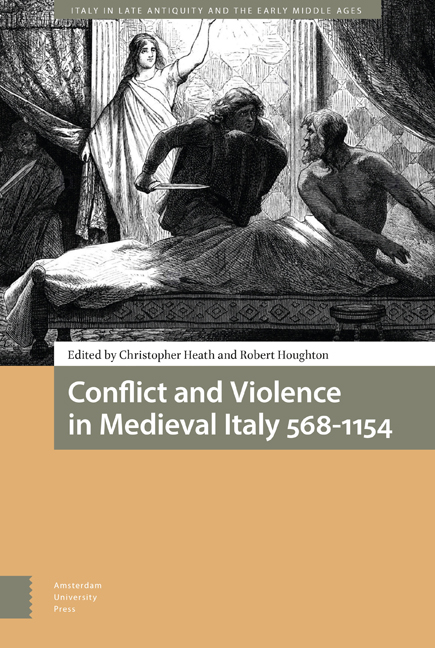Book contents
- Frontmatter
- Table of Contents
- Abbreviations
- Preface
- 1 Introduction: Discordant Minds and Hostile Nations
- 2 Morbidity and Murder: Lombard Kingship’s Violent Uncertainties 568-774
- 3 Insurgency and Counterinsurgency in Lombard Italy (c600-700)
- 4 Troubled Times: Narrating Conquest and Defiance between Charlemagne and Bernard (774-818)
- 5 ‘Nec patiaris populum Domini ab illis divinitus fulminandis Agarenis discerpi’: Handling ‘Saracen’ Violence in Ninth-Century Southern Italy
- 6 Formosus and the ‘Synod of the Corpse’: Tenth Century Rome in History and Memory
- 7 Sex, Denigration and Violence: A Representation of Political Competition between Two Aristocratic Families in Ninth Century Italy
- 8 ‘Italy and her [German] Invaders’: Otto III’s and Frederick Barbarossa’s Early Tours of Italy – Pomp, Generosity and Ferocity
- 9 ‘I Predict a Riot’: What Were the Parmense Rebelling Against in 1037?
- 10 The Strange Case of Deusdedit and Pandulf: Two Accounts of Honorius II’s Election
- Afterword
- Index
7 - Sex, Denigration and Violence: A Representation of Political Competition between Two Aristocratic Families in Ninth Century Italy
Published online by Cambridge University Press: 07 September 2022
- Frontmatter
- Table of Contents
- Abbreviations
- Preface
- 1 Introduction: Discordant Minds and Hostile Nations
- 2 Morbidity and Murder: Lombard Kingship’s Violent Uncertainties 568-774
- 3 Insurgency and Counterinsurgency in Lombard Italy (c600-700)
- 4 Troubled Times: Narrating Conquest and Defiance between Charlemagne and Bernard (774-818)
- 5 ‘Nec patiaris populum Domini ab illis divinitus fulminandis Agarenis discerpi’: Handling ‘Saracen’ Violence in Ninth-Century Southern Italy
- 6 Formosus and the ‘Synod of the Corpse’: Tenth Century Rome in History and Memory
- 7 Sex, Denigration and Violence: A Representation of Political Competition between Two Aristocratic Families in Ninth Century Italy
- 8 ‘Italy and her [German] Invaders’: Otto III’s and Frederick Barbarossa’s Early Tours of Italy – Pomp, Generosity and Ferocity
- 9 ‘I Predict a Riot’: What Were the Parmense Rebelling Against in 1037?
- 10 The Strange Case of Deusdedit and Pandulf: Two Accounts of Honorius II’s Election
- Afterword
- Index
Summary
Abstract
The conflict between Hucpoldings and Supponids is an interesting case study of competition within elites in Carolingian Italy. A peculiar narrative of this conflict has survived, included in the ‘so called’ Epitome chronicorum Casinensium. It is a tale of cupidity, violence and iniquity that took place at Louis II's court between the Count Palatine Hucpold and the Empress Angelberga. This study will examine the literary layer of the account as well as the political situation which grounded the scene of this clash. Coming from the Hucpoldings’ point of view, the tale is an outstanding statement of how Hucpold's descendants wanted to represent and remember the first period of their kinship in Italy, when they managed to settle their power.
Keywords: Hucpoldings, Carolingian Italy, aristocracy, struggle for power, kinship representation
Over the last decades, the concept of competition among the aristocratic elites of Carolingian Europe has enabled scholars to better understand power relations and use of violence among elite groups in Frankish society. In turn, this has clarified the fundamental role played by the sovereign: the possibility for the proceres regni (‘kingdom's magnates’) to have a share in the management of power, earn honours and offices at a local level, and therefore acquire wealth was closely dependent upon their capacity to acquire a degree of Königsnahe (‘proximity to the king’).
An interesting case study for Carolingian Italy is the conflict between the Hucpolding and Supponid kinship groups. These vied for a leading role at the court of Louis II (844-875) and, at the same time, for control over the Emilian region extending between the Po River and the Apennines, from the capital Pavia to the former Exarchate of Ravenna. A very peculiar account of this conflict survives: a narrative of the first centuries of the Abbey of Montecassino, the Epitome chronicorum Casinensium (ECC), which describes an episode of lewdness, violence and injustice at the court of Louis II. The protagonists of this fictional episode are real historical figures: Count Palatine Hucpold, the first scion of the Hucpolding dynasty in Italy, his wife Andaberta and Empress Angelberga, of the Supponid lineage.
- Type
- Chapter
- Information
- Conflict and Violence in Medieval Italy 568-1154 , pp. 205 - 242Publisher: Amsterdam University PressPrint publication year: 2021



